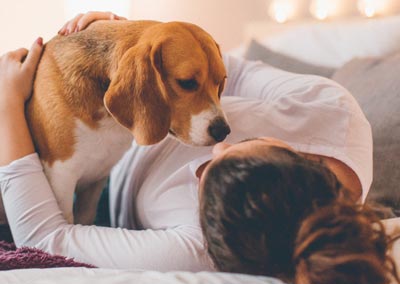Dogs Are More Expressive When Humans Are Watching Them

The results of a new study indicate that dogs make more facial expressions when a human is paying attention to them than they do otherwise. This is new information in the study of canine communication.
Canine Facial Expressions: The Study
In the past, scientists and behaviorists thought that the facial expressions of animals other than primates are mostly involuntary, do not have to do with communication, and happen automatically in response to specific emotions. However, in a recent study, researchers found that domestic dogs' facial expressions are much more voluntary than previously thought.
Dogs in the study were presented with food in varying situations. Sometimes, the human giving the food looked attentively at the dog. Other times, the human offered the food but looked away. The dogs were filmed, and their facial expressions were later analyzed. The results of the study indicate that dogs make significantly more facial expressions when a human is watching them than they do when there is no human attention on them.
Dogs' facial expressions are not as involuntary as previously thought. Because the dogs in the study made more facial expressions when given food by an attentive human than when presented with food and no attention, it is unlikely that emotional stimulus alone triggers facial expressions in dogs. Instead, researchers believe that dogs can control their facial expressions and that they use them to communicate with humans.
This study and others like it are serving to confirm what most dog lovers already know: dogs and their people are strongly bonded and, while they have different means of communicating, they usually managed to do so quite well.
Works Cited
- Juliane Kaminski, J. H. (2017, Oct. 19). Human attention affects facial expressions in domestic dogs. Retrieved from nature.com: DOI: 10.1038/s41598-017-12781-x.
You May Also Like These Articles:
Petting vs. Praise: Which Does a Dog Like Best?
Gazing into Your Dog's Eyes Releases Love Hormone
Why Do Dogs Tilt Their Heads When You Talk?
Why Do Some Dogs Curl up in a Ball When They Go to Sleep?
Why Does Your Dog Follow You to the Bathroom?
Let Sleeping Dogs Lie and They'll Learn Better
Disclaimer: This website is not intended to replace professional consultation, diagnosis, or treatment by a licensed veterinarian. If you require any veterinary related advice, contact your veterinarian promptly. Information at DogHealth.com is exclusively of a general reference nature. Do not disregard veterinary advice or delay treatment as a result of accessing information at this site. Just Answer is an external service not affiliated with DogHealth.com.
Notice: Ask-a-Vet is an affiliated service for those who wish to speak with a veterinary professional about their pet's specific condition. Initially, a bot will ask questions to determine the general nature of your concern. Then, you will be transferred to a human. There is a charge for the service if you choose to connect to a veterinarian. Ask-a-Vet is not manned by the staff or owners of DogHealth.com, and the advice given should not delay or replace a visit to your veterinarian.



